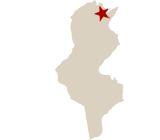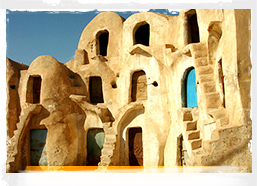An Introduction to Tunisia
Tunisia is the smallest of the nations situated along North Africa's Atlas mountain range. The south of the country is desert, but much of the remainder consists of particularly fertile soil and Tunisia has 1,300km (810 miles) of coastline. Both played a prominent role in ancient times, first with the famous Phoenician city of Carthage, then as the Roman province of Africa, known as the 'bread basket' of Rome. Under Arab rule and part of the Ottoman Empire from the 8th century, the country passed under French protectorate in 1881 and was given independence in 1956. Nationalist leader Habib Bourguiba became its first president the following year. See full country profile.Latest Research News from Africa
1 current African job:

GOVERNMENT: Republic
AREA: 163,610 sq km
POPULATION: 10,629,186 (July 2011 est.)
MAJOR LANGUAGE: Official Language: Arabic

Some business and general info
The Market Research Industry
Trade and Industry in Tunisia
Tunisia has won seven medals in its dozen Olympics to date - four of them going to one of the pioneers of African long-distance running, Mohammed Gammoudi - but its last gold was won by Oussama Mellouli in the Men's 1500m Freestyle Swimming in Beijing.
Go to next country
Tunisia is the smallest of the nations situated along North Africa's Atlas mountain range. The south of the country is desert, but much of the remainder consists of particularly fertile soil and Tunisia has 1,300km (810 miles) of coastline. Both played a prominent role in ancient times, first with the famous Phoenician city of Carthage, then as the Roman province of Africa, known as the 'bread basket' of Rome. Under Arab rule and part of the Ottoman Empire from the 8th century, the country passed under French protectorate in 1881 and was given independence in 1956. Nationalist leader Habib Bourguiba became its first president the following year.
The country was governed by the authoritarian regime of President Zine El Abidine Ben Ali from 1987 to 2011 before he fled during the Tunisian revolution - a revolution which began after Mohamed Bouazizi, a street vendor, set himself on fire in protest at the humiliating confiscation of his wares by a municipal official. His act has had extraordinary ramifications, with the Tunisian uprising precipitating revolts throughout the Arab world in countries such as Egypt, Algeria, Yemen, Jordan, Bahrain, Mauritania, Pakistan and Libya.
GDP: $100 billion- $9,400 per capita (2010 estimates)
Religions Muslim 98%, Christian 1%, Jewish and other 1%
Currency: Tunisian Dinar (TND) - GBP 1 = TND 2.23
Telephone Code: +216
Research Industry
The MR industry in the Maghreb region (Algeria, Morocco and Tunisia) turned over $US 20m in 2009 - up from $17m and $19m in 2007 and 2008 respectively and representing net growth of 4.1%.An export-oriented country in the process of liberalizing and privatizing its economy, Tunisia has averaged 5% GDP growth since the early 1990s, although it has suffered from corruption benefiting the former president's family. The country has a diverse economy with a strong service sector: agriculture accounts for 11.6% of GDP, manufacturing industry 25.7%, and services 62.8%; but continues to suffer from high unemployment, especially among the young.
In 2010 Tunisia's $16.7bn of exports included clothing, hydrocarbons and electrical equipment, with France the biggest partner (27.6%) but major roles also for Italy (18.7%), Germany (10.4%) and Libya (6.9%). Imports of $20.26bn included machinery, chemicals and food, with France aga'n the main partner (23.3%), followed by Italy (19.1%), Germany (9.2%) and Spain (4.9%).
Email me:
laurence@mrweb.com

